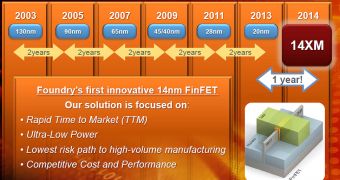AMD has basically created GlobalFoundries, so while the latter does accept orders from various firms, its activities can still be taken as a sign of what AMD might be brewing in its labs.
That is why the newest announcement on its part could be taken as a hint that, like rumors started saying back in October 2012, AMD is going to make ARM-based processors sooner or later.
Sure, GlobalFoundries may have only demonstrated its 14nm FinFET manufacturing process, and its advantages over 28nm, but it used a dual-core ARM Cortex-A9 chip.
That's right, instead of an X86 processor or some such things, the foundry made a dual-core ARM Cortex-A9 using three-dimensional 14nm-XM FinFET transistors.
Standard design implementation flows and sign-off simulations showed a twofold improvement in energy efficiency over 28nm-SLP.
The latter normally use 12-track libraries, but the 14nm process has 9-track libraries and, by extension, lower die size.
Furthermore, frequencies are expected to be 61% better on 14nm than on 28nm implementations.
“These preliminary results illustrate the potential benefits of FinFET technology applied to an ARM processor-based system-on-chip (SoC),” said Dipesh Patel, executive vice president and general manager of physical IP division at ARM.
“Early collaboration on manufacturing process technologies allows GlobalFoundries and ARM to identify and address SoC design challenges and reduce risks to adoption by our mutual customers.”
Globalfoundries made the announcement at the Common Platform Technology Forum in Santa Clara, CA.
For those who want to know the technical aspects, 14nm-XM uses a modular technology architecture where a 14nm FinFET device is combined with 20nm-LPM process back-end-of-line (BEOL) interconnect flow.
The fin pitch is of 48nm, the same as what Globalfoundries thinks Intel will use for its own FinFET. Using 20nm-LPM will enable rapid time-to-market, since it is already mature.
“Our deep collaboration with ARM is continuing to pay off as we work together to optimize ARM IP for our leading-edge process technology,” said Mike Noonen, executive vice president of marketing, sales, design and quality at GLOBALFOUNDRIES.
Basically, even if AMD doesn't make ARM chips, ARM holdings will have all the reason it needs to place its own orders with Globalfoundries.

 14 DAY TRIAL //
14 DAY TRIAL //